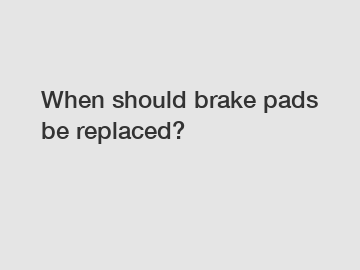When should brake pads be replaced?
When should brake pads be replaced?
Brake pads play a crucial role in ensuring the safety and efficiency of a vehicle's braking system. Over time and extensive use, brake pads wear down and lose their effectiveness, potentially compromising the performance of the brakes. Therefore, it is essential to replace them when they reach a certain condition. .
To determine when brake pads should be replaced, there are several key factors to consider. Firstly, the manufacturer's recommendations should be followed. These guidelines often state the specific mileage or time interval at which the brake pads should be replaced. Additionally, paying attention to warning signs such as squeaking or grinding noises, reduced braking responsiveness, or a pulsing brake pedal can indicate that the brake pads are worn and in need of replacement.

The need for brake pad replacement also becomes evident through visual inspection. By examining the thickness of the brake pad friction material, one can assess their wear level. It is important to note that brake pads typically have a wear indicator, a small metal tab that emits a high-pitched squeal when the brake pads become too thin. Once this indicator is visible, it indicates that the brake pads have reached their minimum allowed thickness and must be replaced promptly.
By replacing brake pads at the appropriate time, several benefits are achieved. Firstly, optimal braking performance is assured, enabling the vehicle to stop efficiently and quickly when necessary. This plays a critical role in preventing accidents and ensuring the safety of both the driver and others on the road. Secondly, replacing brake pads in a timely manner can prevent further damage and expensive repairs. If brake pads are significantly worn, they can cause damage to the rotors, resulting in more extensive and costly repairs.
Additionally, regular brake pad replacement can contribute to extended brake system longevity. By promptly addressing worn brake pads, excessive wear on other brake components can be minimized. This proactive approach can save money and help maintain the overall health and performance of the vehicle's braking system.
In conclusion, brake pads should be replaced when they reach a certain condition or based on the manufacturer's recommendations. Regular inspection and awareness of warning signs are crucial in determining the appropriate time for replacement. Replacing brake pads promptly not only ensures optimal braking performance but also prevents extensive damage and costly repairs. By prioritizing brake pad maintenance, drivers can embrace safer journeys and enjoy the long-term benefits of a well-functioning braking system.
For more information, please visit bmw ceramic brake pads china factory, ceramic vs metal brakes, semi metallic brake pad supplier.

Comments
0